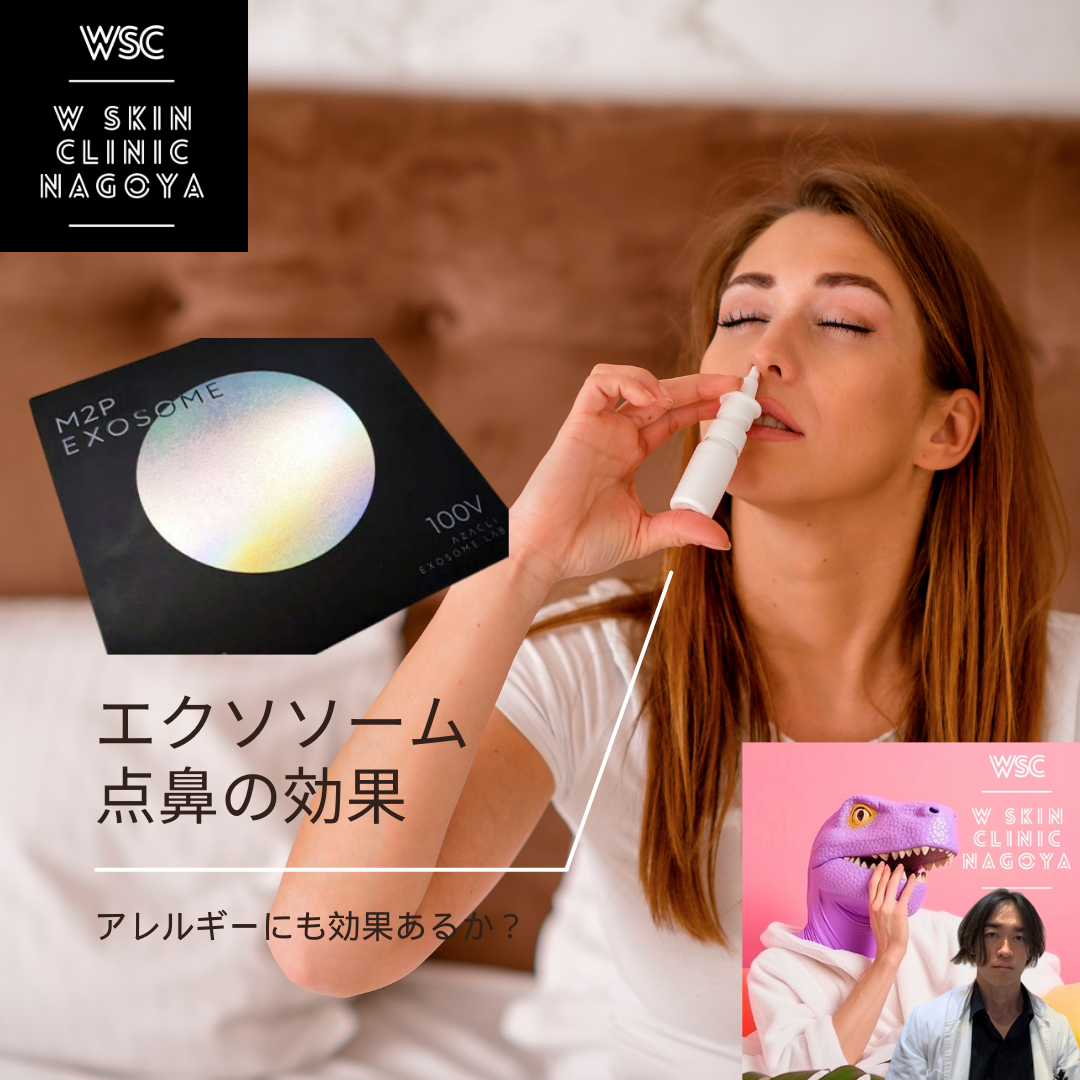NEWSお知らせ
2024.11.03|ブログ
エクソソーム点鼻は、脳細胞の修復、再生作用だけでなく、鼻粘膜のアレルギーを改善する可能性あるか?名古屋の美容皮膚科医が解説

エクソソーム点鼻は、脳細胞の修復、再生作用だけでなく、鼻粘膜のアレルギーを改善する可能性あるか?名古屋の美容皮膚科医が解説
こんにちは、Wスキンクリニック名古屋、院長の加藤晃司です。
今回は、エクソソーム点鼻は、脳細胞の修復、再生作用だけでなく、鼻粘膜のアレルギーを改善する可能性あるか?について解説します。
エクソソーム点鼻は、エクソソームの再生効果を利用して、脳細胞の修復や再生をサポートするだけでなく、鼻粘膜のアレルギー症状にも改善効果をもたらす可能性があると考えられています。エクソソームは細胞から分泌される小さなカプセル状の物質で、成長因子や抗炎症物質が豊富に含まれており、細胞間のコミュニケーションを助ける働きを持っています。
以下に、エクソソーム点鼻による脳細胞および鼻粘膜への作用について詳しく説明します。
- エクソソームの作用メカニズムと点鼻による効果
エクソソームには、さまざまな成長因子、抗炎症作用を持つタンパク質やリポタンパク質が含まれており、細胞に取り込まれると細胞の修復や再生をサポートします。点鼻による投与は、鼻腔の粘膜からエクソソームが吸収されやすく、鼻腔とつながる脳や鼻腔自体に効果が期待される方法です。
- 脳細胞への効果
神経保護効果:エクソソームに含まれる成長因子(例えば、BDNFやGDNFなど)は神経細胞の成長を促進し、神経の保護や修復に役立ちます。点鼻投与は、鼻腔から脳への直接的なルート(嗅神経を経由した経路)により、脳へ届きやすく、神経系への作用が期待されています。
抗炎症効果:エクソソームには抗炎症作用のある成分も含まれており、脳内の炎症を抑制することで、神経のダメージを軽減し、認知機能の低下や神経変性疾患の進行を防ぐ効果が期待されます。
- 鼻粘膜への効果
粘膜の抗炎症作用:エクソソームの抗炎症成分により、鼻粘膜の炎症反応を軽減する可能性があります。特に、アレルギー性鼻炎や慢性副鼻腔炎で見られる炎症や腫れを抑える作用が期待されます。
免疫応答の調整:エクソソームは、免疫細胞の働きを調整し、過剰な免疫反応を抑える働きがあります。これにより、アレルギー反応を引き起こすヒスタミンやサイトカインの分泌が減少し、アレルギー症状が和らぐ可能性が示唆されています。
- エクソソーム点鼻が鼻粘膜のアレルギーに有効とされる根拠
- 抗炎症作用によるアレルギー緩和
アレルギー症状は、主に鼻粘膜の炎症や免疫系の過剰反応によって引き起こされます。エクソソーム点鼻には、炎症を抑制し、鼻粘膜の腫れを軽減する効果が期待されます。エクソソームの成分がマクロファージやリンパ球に作用し、炎症性サイトカインの放出を抑制することで、アレルギー反応の症状を和らげる可能性があります。
- 免疫応答の調整とアレルギー反応の抑制
エクソソームには免疫細胞の働きを調整する成分が含まれているため、過剰な免疫反応を正常化し、アレルギー反応を起こしにくくする可能性があります。たとえば、T細胞やB細胞といった免疫細胞の反応を抑え、アレルギーを引き起こすIgE抗体の産生を低下させることで、アレルギー性鼻炎のような症状が軽減されることが期待されます。
- 粘膜の再生効果
エクソソームに含まれる成長因子は、細胞の修復や再生を促進するため、鼻粘膜がダメージを受けた際の組織修復が進みやすくなる効果が期待されます。アレルギー反応によって炎症が繰り返されることで、鼻粘膜にダメージが蓄積されやすいですが、エクソソームにより粘膜の健康が維持されやすくなります。
- エクソソーム点鼻が期待できるその他の効果
エクソソーム点鼻は、脳や鼻粘膜に対する効果だけでなく、全身の健康に寄与する可能性もあります。
- 認知機能の改善
脳細胞に対する修復・再生作用により、エクソソームは認知機能の向上に役立つ可能性があります。特に、アルツハイマー病やパーキンソン病のような神経変性疾患に対する予防的な効果も期待されています。
- 自律神経の安定
エクソソームには神経系の調整をサポートする成分も含まれているため、鼻から吸収されたエクソソームが脳や神経系に作用し、自律神経の安定化が期待されます。これにより、アレルギー症状の一因となるストレス反応の軽減も考えられます。
- エクソソーム点鼻を行う際の注意点
- アレルギー反応のリスク
エクソソーム点鼻による治療は、一般的に安全とされていますが、使用するエクソソームの由来によってはアレルギー反応を引き起こすリスクもあるため、信頼できる施設での使用が推奨されます。
- 長期的な効果と研究の進展
エクソソーム点鼻は比較的新しい治療法であり、長期的な効果や副作用についての研究がまだ進行中です。効果が確立されるには、さらなる臨床研究が必要です。
まとめ
エクソソーム点鼻は、脳細胞の修復や再生だけでなく、鼻粘膜のアレルギー症状を改善する可能性が期待されています。エクソソームの持つ抗炎症作用や免疫調整効果が、鼻粘膜の炎症や過剰な免疫反応を抑制するため、アレルギー性鼻炎の緩和に役立つと考えられます。
エクソソーム点鼻は、アレルギーの緩和や脳機能改善に対して多面的な効果を発揮する可能性があるため、今後さらに多くの研究が進むことで、エクソソームの有効性と安全性が確立されることが期待されています。
Wスキンクリニック名古屋でのエクソソーム治療はこちら
https://www.w-clinic-nagoya.com/acne/exosome
NMN点滴はこちら
https://www.w-clinic-nagoya.com/beauty-drip/nmn
高濃度ビタミンC点滴はこちら
https://www.w-clinic-nagoya.com/beauty-drip/vitamin-c
*当院では
NMNは一般社団法人NMN医療研究会、エクソソームはセルソース株式会社のM2P-エクソソームを使用しています。
TMS治療はこちら
https://www.w-clinic-nagoya.com/tms
当院では無料でスタッフカウンセリングを行なっております。
お気軽にご予約くださいませ
Wスキンクリニック名古屋 (美容皮膚科)
https://www.w-clinic-nagoya.com/
〒461-0005 愛知県名古屋市東区東桜 2-4-1 第3コジマビル6F
TEL 052-7377-7117(10:00~19:00)
LINE ID @w.nagoya
高岳駅より徒歩4分 / 新栄町駅より徒歩5分
お車でお越しの方
名鉄協商パーキングチケットをお渡しいたしますので、クリニック近くのパーキングをご利用ください。
ご予約、お問合せ、Wスキンクリニック名古屋公式LINEからも可能です。
LINE ID : @w.nagoya
友達追加は↓から
Wスキンクリニック名古屋公式インスタ↓
https://www.instagram.com/w.skinclinic.nagoya?igsh=NHhoODFnaXB2b2ll&utm_source=qr
Wスキンクリニック院長 加藤晃司インスタ↓
https://www.instagram.com/w.skin.nagoya.kojikato?igsh=aW9nbWZwNjNjZ3pz&utm_source=qr
Can Nasal Exosome Therapy Not Only Repair and Regenerate Brain Cells but Also Improve Nasal Mucosal Allergies? Explanation by a Nagoya-based Cosmetic Dermatologist
Hello, I’m Dr. Koji Kato, director of W Skin Clinic Nagoya.
Today, I will explain whether nasal exosome therapy may not only support the repair and regeneration of brain cells but also improve nasal mucosal allergies.
Nasal exosome therapy has potential for not only supporting brain cell repair and regeneration through the regenerative effects of exosomes but also alleviating allergy symptoms in the nasal mucosa. Exosomes are small capsule-like particles secreted from cells that contain growth factors and anti-inflammatory substances, facilitating communication between cells.
Here is a detailed explanation of how nasal exosome therapy affects both brain cells and nasal mucosa:
- Mechanism of Action and Effects of Nasal Exosome Therapy
Exosomes contain various growth factors, anti-inflammatory proteins, and lipoproteins. When absorbed by cells, exosomes support repair and regeneration. Nasal administration allows exosomes to be absorbed through the nasal mucosa, directly targeting the brain and nasal passages.
- Effects on Brain Cells
Neuroprotective Effects: Growth factors in exosomes, such as BDNF and GDNF, promote nerve cell growth, offering neuroprotective and regenerative benefits. Nasal delivery is believed to facilitate direct access to the brain (through the olfactory nerve), enhancing their impact on the nervous system.
Anti-inflammatory Effects: Exosomes contain anti-inflammatory components that can reduce inflammation in the brain, potentially mitigating nerve damage, cognitive decline, and the progression of neurodegenerative diseases.
- Effects on Nasal Mucosa
Anti-inflammatory Effects on Mucosa: Exosome’s anti-inflammatory components may reduce inflammation in the nasal mucosa, potentially alleviating symptoms of allergic rhinitis and chronic sinusitis.
Modulation of Immune Response: Exosomes regulate immune cell function, potentially suppressing excessive immune reactions. This may reduce the release of histamines and cytokines that trigger allergic reactions, suggesting relief for allergy symptoms.
- Evidence Supporting Nasal Exosome Therapy’s Efficacy for Allergic Conditions
- Allergy Relief Through Anti-inflammatory Effects: Allergic symptoms are primarily due to nasal mucosal inflammation and an overactive immune system. Nasal exosome therapy may reduce inflammation and swelling in the nasal mucosa. Exosome components interact with macrophages and lymphocytes, suppressing the release of inflammatory cytokines, which may relieve allergy symptoms.
- Modulation of Immune Response and Suppression of Allergic Reactions: Exosomes contain components that regulate immune cells, potentially normalizing excessive immune responses and reducing allergy susceptibility. For example, by inhibiting T-cell and B-cell responses, they could reduce the production of IgE antibodies that trigger allergies, which may alleviate symptoms of allergic rhinitis.
- Mucosal Regeneration: Growth factors in exosomes promote cell repair and regeneration, potentially enhancing tissue repair in the nasal mucosa following damage. Allergic reactions can cause cumulative damage to nasal mucosa, but exosomes may help maintain mucosal health.
- Additional Benefits of Nasal Exosome Therapy
Nasal exosome therapy may contribute to overall health beyond the brain and nasal mucosa.
- Cognitive Function Improvement: Exosomes’ regenerative effects on brain cells may help improve cognitive function, potentially offering preventive benefits for neurodegenerative diseases like Alzheimer’s and Parkinson’s.
- Autonomic Nervous System Stability: Exosomes contain components that support nervous system regulation, and exosomes absorbed through the nose may stabilize autonomic functions. This may also reduce stress responses, which are sometimes linked to allergy symptoms.
- Caution When Using Nasal Exosome Therapy
- Risk of Allergic Reactions: Nasal exosome therapy is generally considered safe, but depending on the exosome source, there may be a risk of allergic reactions. It is recommended to undergo treatment at a trusted facility.
- Long-term Efficacy and Research Progress: As a relatively new treatment, further studies on the long-term effects and potential side effects of nasal exosome therapy are ongoing, with additional clinical research required to confirm its efficacy.
Summary
Nasal exosome therapy holds promise for improving not only brain cell repair and regeneration but also allergic symptoms in the nasal mucosa. The anti-inflammatory and immune-regulating effects of exosomes may reduce inflammation and excessive immune responses in the nasal mucosa, providing potential relief for allergic rhinitis.
With further research, nasal exosome therapy may establish its effectiveness and safety in allergy relief and brain function enhancement, offering multifaceted benefits.




